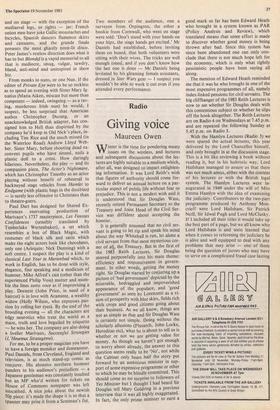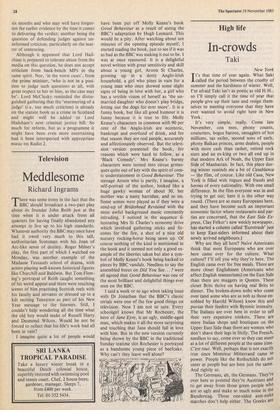Radio
Giving voice
Maureen Owen
\Vinter is the time for pondering meaty issues on the wireless, and lectures and subsequent discussions about the lec-
tures are highly suitable to a medium which, after all, was designed to impart enlighten- ing information. It was Lord Reith's wish that figures of authority should come for- ward to deliver an annual lecture on a par- ticular aspect of public life without fear or prejudice. This is not a modest wish and it is understood that Sir Douglas Wass, recently retired Permanent Secretary to the Treasury and Joint Head of the Civil Ser- vice was diffident about accepting the honour.
It is generally assumed that no civil ser- vant is going to let rip and speak his mind about the way Whitehall is run, let alone a civil servant from that most mysterious cor- ner of all, the Treasury. But in the first of the 1983 Reith Lectures, Sir Douglas steered purposefully into his main theme: efficiency and responsiveness in govern- ment. In other words, getting the money right. Sir Douglas started by conjuring up a picture of tad government' depicted by the miserable, bedraggled and impoverished
appearance of the populace, and 'good
government' as seen by Lorenzetti as a vi- sion of prosperity with blue skies, fields rich with crops and good citizens going about their business. As we all know, things are not as simple as that and Sir Douglas Wass is certainly not simple. Doing without the scholarly allusions (Plutarch, John Locke, Heroditas etc), what he is about to tell us is whether or not we are getting value for money. As though we haven't got enough to worry about already, the answer to this question seems really to be 'No', not while the Cabinet only hears half the story put forward by an ambitious minister in sup- port of some expensive programme or other to which he may be blindly committed. This should come as no surprise to followers of
Yes Minister but I thought I had heard Sir Douglas tell Mary Goldring in a previous interview that it was all highly exaggerated. In fact, the only prime minister to earn a
good mark so far has been Edward Heath who brought in a system known as PAR (Policy Analysis and Review), which translated means that some effort is made to discover whether good money is being thrown after bad. Since this system has since been abandoned one can only con- clude that there is not much hope left for the economy, which is only what rightly pessimistic people have been saying all along.
The mention of Edward Heath reminded me that it was he who brought in one of the most expensive programmes of all, namely index-linked pensions for civil servants. The big cliffhanger of the 1983 Reith Lectures is now to see whether Sir Douglas deals with this contentious subject or whether he slips off the hook altogether. The Reith Lectures are on Radio 4 on Wednesdays at 7.45 p.m. and are repeated the following Sunday at 5.45 p.m. on Radio 3.
With the Hamlyn Lectures (Radio 3) we were spared the actual lectures, this year delivered by the Lord Chancellor himself, and only brought in at the discussion stage. This is a bit like reviewing a book without reading it, but in his hubristic way, Lord Hailsham managed to assure us that there was not much amiss, either with the content of his lectures or with the British legal system. The Hamlyn Lectures were in- augurated in 1949 under the will of Miss Emma Hamlyn with the idea of examining the judiciary. Contributors to the two-part programme produced by Anthony Mon- crieff were Lord Hailsham, Sir Patrick Neill, Sir Idwal Pugh and Lord McClusky. If I included all their titles it would take up the best part of a page, but we all know who Lord Hailsham is and soon learned that when it comes to reforming the judiciary he is alive and well equipped to deal with any problems that may arise -- one of them being the question of jurors who may have to serve on a complicated fraud case lasting
six months and who may well have forgot- ten the earlier evidence by the time it comes to delivering the verdict; another being the question of defending judges against un- informed criticism, particularly on the mat- ter of sentencing. Although it appeared that Lord Hail- sham is prepared to tolerate abuse from the media on this question, he does not accept criticism from back-bench MPs in the same spirit. Nor, in the worst cases', from the prime minister, 'who is not in a posi- tion to judge such questions at all, with great respect to her or him, as the case may be'. Lord McClusky reminded the distin- guished gathering that the 'murmuring of a judge' (i.e. too much criticism) is already on the statute book as a crime in Scotland and might well be added to Lord Hailsham's next criminal justice bill. So much for reform, but as a programme it might have been even more entertaining had it been interspersed with appropriate music on Radio 2.



























































 Previous page
Previous page